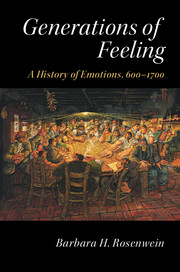Book contents
- Frontmatter
- Dedication
- Epigraph
- Contents
- List of plates
- List of figures
- List of maps and genealogies
- List of tables
- Prefatory note
- Acknowledgments
- List of abbreviations
- Introduction
- 1 Ancient theories
- 2 Attachment and detachment
- 3 Alcuin's therapy
- 4 Love and treachery
- 5 Thomas’ passions
- 6 Theatricality and sobriety
- 7 Gerson's music
- 8 Despair and happiness
- 9 Hobbes’ motions
- Conclusion
- Bibliography
- Index
9 - Hobbes’ motions
Published online by Cambridge University Press: 05 November 2015
- Frontmatter
- Dedication
- Epigraph
- Contents
- List of plates
- List of figures
- List of maps and genealogies
- List of tables
- Prefatory note
- Acknowledgments
- List of abbreviations
- Introduction
- 1 Ancient theories
- 2 Attachment and detachment
- 3 Alcuin's therapy
- 4 Love and treachery
- 5 Thomas’ passions
- 6 Theatricality and sobriety
- 7 Gerson's music
- 8 Despair and happiness
- 9 Hobbes’ motions
- Conclusion
- Bibliography
- Index
Summary
“7th September. I went to visit Mr. Hobbes, the famous philosopher of Malmesbury, with whom I had long acquaintance. From his windows, we saw the whole equipage and glorious cavalcade of the young French Monarch, Louis XIV, passing to Parliament.” So wrote John Evelyn in his diary for the year 1651. He marveled at the splendid parade of officers, nobility, and servants, and “the King himself like a young Apollo.”
Thomas Hobbes (1588–1679), born of “obscure parentage” in Malmesbury, England, was educated at Oxford and spent most of his life as tutor and librarian for the Cavendish family, apart from a few other stints, as for example as math tutor to the future Charles II in exile. What Hobbes thought of the procession of Louis XIV we do not know. But he must have had considerably more than Apollonian kings on his mind. Only a few months before, he had published his Leviathan in England and in English – even though he had been living in Paris since 1640. The book justified the new Parliamentary authority under Cromwell as much as it justified kings: self-preservation required people to obey whatever regime protected them.
In Chapter 6 of the Leviathan, Hobbes presented a list of “voluntary motions; commonly called the passions.” His discussion so early in the book of what he called “motions” – clearly an ancestor of our term “emotions” – suggests that he considered them to constitute an important foundation for his moral and political philosophy. Indeed, he had already talked about the emotions in The Elements of Law Natural and Politic (1640), which circulated in manuscript until it was published as two separate books, Human Nature and De corpore politico, in 1650. These, along with De cive (1642), which also had a few things to say about emotions, were no doubt the works that led Evelyn to call Hobbes “the famous philosopher of Malmesbury.” Later, in 1655, Hobbes published De corpore (part 1 of his Elements of Philosophy) with an English translation the following year, and in 1658 his De homine appeared, each with further thoughts about the role of the passions in human nature.
- Type
- Chapter
- Information
- Generations of FeelingA History of Emotions, 600–1700, pp. 288 - 313Publisher: Cambridge University PressPrint publication year: 2015



